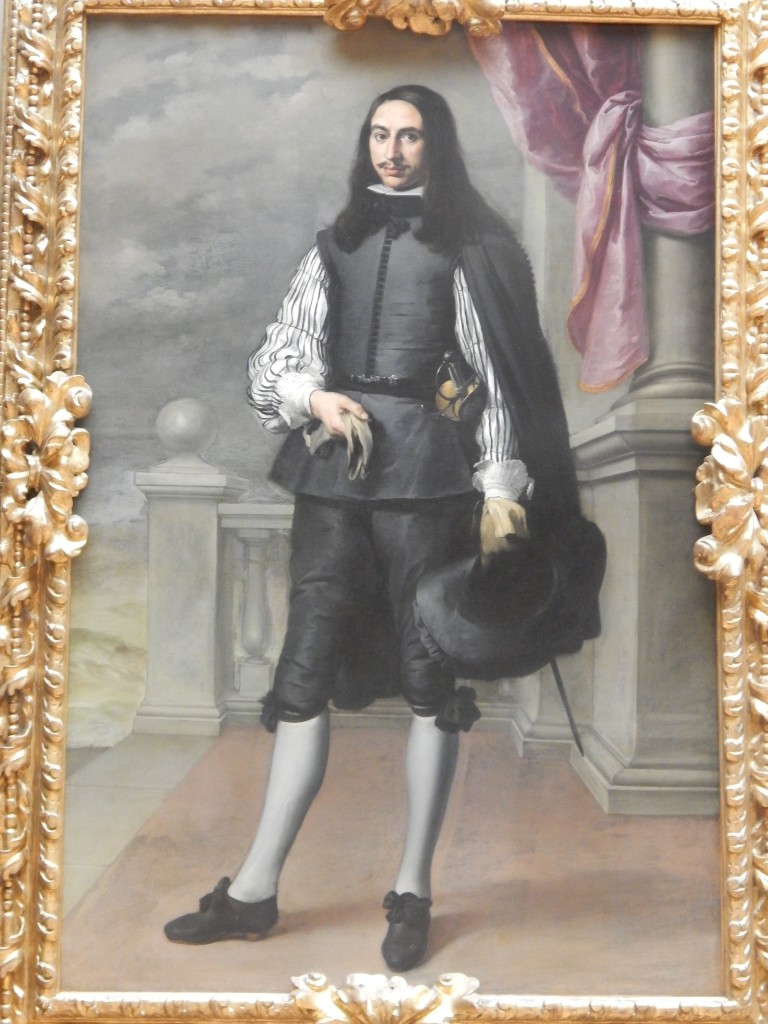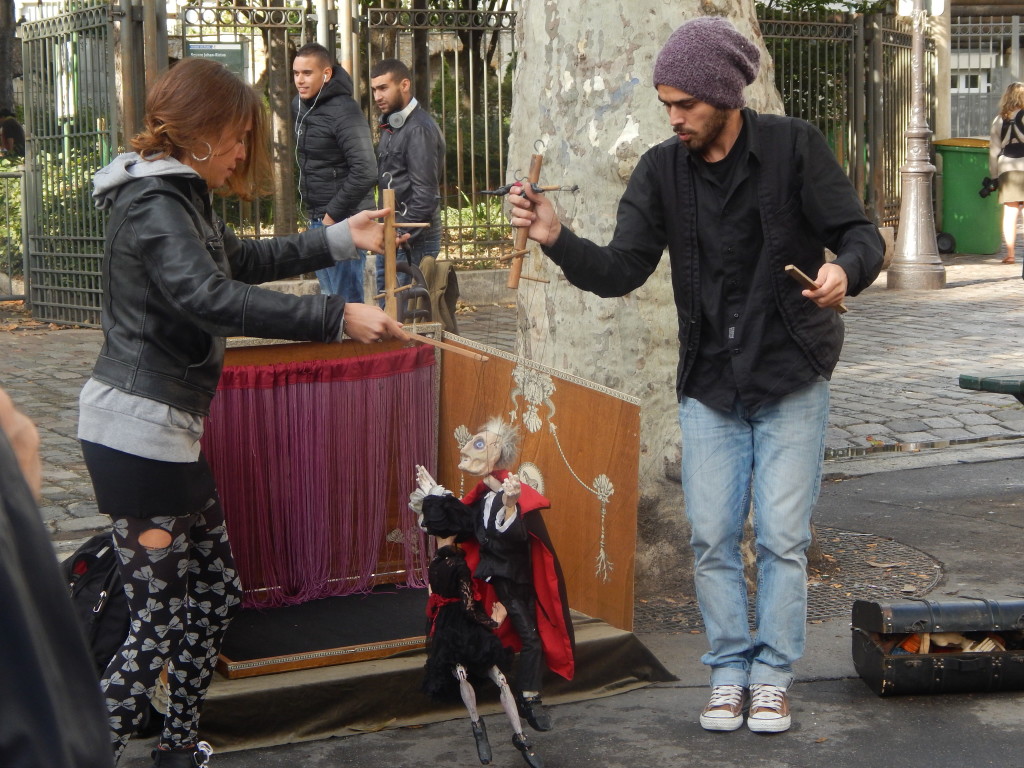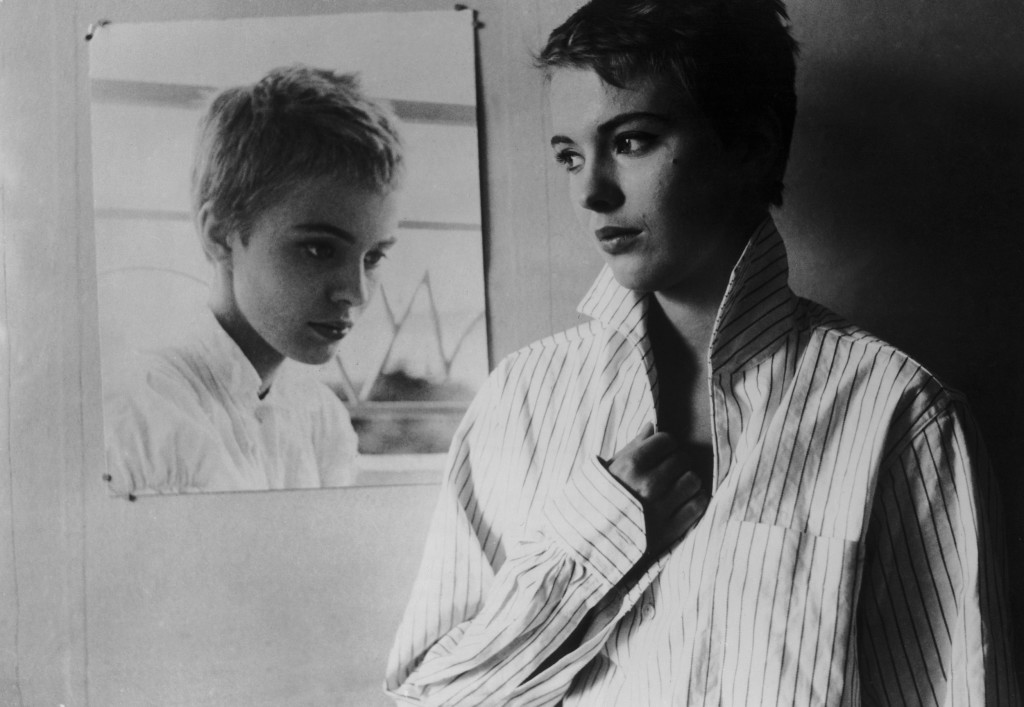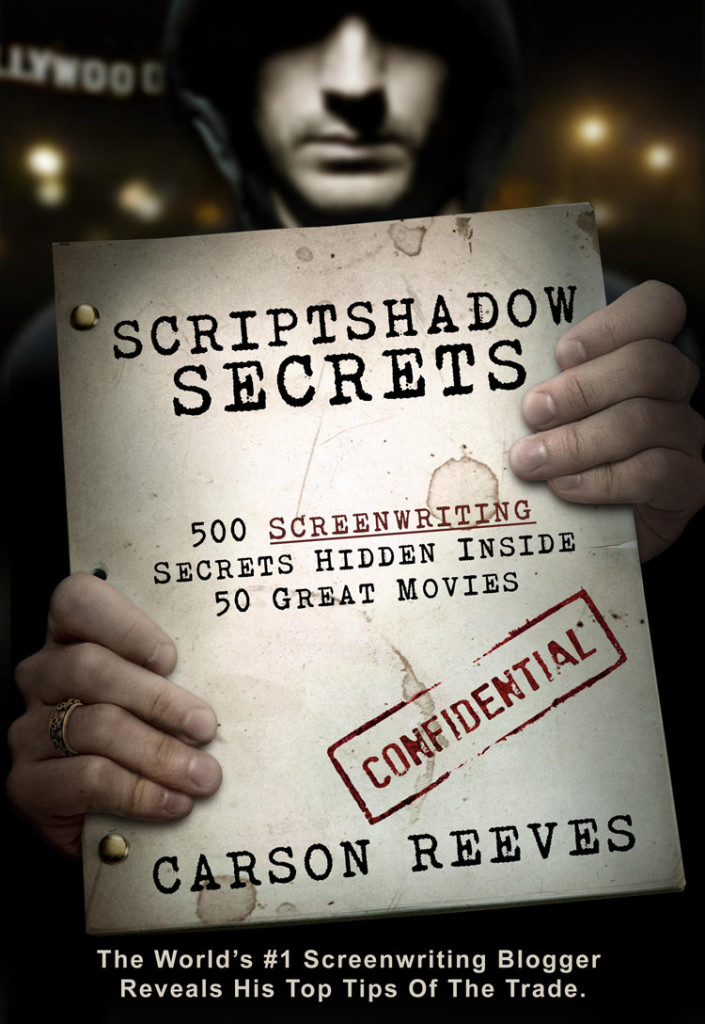Genre: Heist
Premise: An American thief living in Paris (Paris. See?? French Week!) is coerced into pulling off a complex heist in order to save his kidnapped wife.
About: Today’s script finished low on the 2011 Black List. It was originally a pitch that started a bidding war, with Dreamworks delivering the winning bid over Warner Brothers. It’s currently in development at the studio. The writer, John Hlavin, wrote two episodes for the critically acclaimed show, “The Shield.” His biggest credit, however, came last year, when he wrote the latest film in the Underworld series, “Underworld: Awakening.” He also sold a spec to Warner Brothers a few years ago called “The Gunslinger,” which Roger reviewed for me. Oh yeah, baby. It’s a good old-fashioned professional spec script review here on Scriptshadow. ☺
Writer: John Hlavin
Details: 132 pages
 I think this has Tom Cruise written all over it.
I think this has Tom Cruise written all over it.
Wow, after yesterday, I’m surprised some of you are still reading. It’s always funny to me how up-in-arms people get when you criticize any historic pillar of cinema or screenwriting. It’s as if these things can’t be challenged, that just because they’re talked about in film school or influenced great filmmakers, we must all fall in line, nod are heads, and agree that they are great.
Personally, I think that’s a load of b.s. If you think the French New Wave is a bunch of New Wave baloney, say so. If it’s harder for you to suspend your disbelief when you watch a black and white movie, say so. If you believe the latest Oscar contender that everyone can’t shut up about is a boring piece of pretentious hyena vomit, say so.
I can tell you this. The WORST thing you can do is to pretend to like something you don’t. Storytelling and cinema are about finding the truth within yourself and your story so that what you create is real. That was the spirit behind the rebellion that was the French New Wave, and I’d think those guys would be happy to hear people rebelling against them for the same reason.
There’s too much bullshitting in Hollywood, born out of a fear that you’ll sound inferior or stupid if you hate something everyone else loved or don’t believe in something everyone else believes in. Stick by your opinion. It’s what makes you you.
Where does that leave us today? With a heist film, of course! This one a pitch to Dreamworks. The whole pitch sale thing always confused me. It’s so damn hard to write a good script. Even the best screenwriters in the business struggle to do so. And you really don’t know if you have something until you’re finished and the script is out there. So to bankroll a script that hasn’t even been written yet is always a huge gamble (unless it’s based off a well-known pre-existing property of course). I suppose if the writer is proven and has an extremely specific outline, so you know exactly what you’re getting, maybe then it’s worth going for, but in my mind, you just don’t know what you got until those 110 pages (or in this case, those 130 pages!) are printed up. So why risk it??
35 year-old Michael Kitson does one thing really well – he robs banks. He’s been doing it all his life and he’s never been caught. His current city of choice is Paris. Why rob those lame bunker-looking buildings in the U.S. when you can rob a building with some style and history, you know? Then afterwards, you can stroll down the street and grab a fresh pain au chocolate from the café.
But Michael’s getting tired of the grind. And the love of his life, his wife Elise, is starting to nag him about quitting. So Michael makes the call. He’s officially retiring. He and Elise will head off to some island with a pretty name and never come back again. I mean why not? He’s got all the money in the world anyway.
Well not ALL the money apparently. Becker, Michael’s go-to middle-man, has a new job for him. The “French Blues.” The “Blues” are a set of blue diamonds that were thought to be made-up. No one’s actually seen them. But according to Becker, they’re real, and his client wants them badly. Sorry, Michael says, he made a promise to his wife. He’s out for good.
Except when Michael gets home, he learns that he’s not out of shit. Elise isn’t home, and it doesn’t take long for Michael to realize she’s been kidnapped. The call comes moments later. “Do the job. You get your wife back.” Shit. Michael freaks. He’s typically calm under pressure but when his wife is involved, all that goes out the finetre.
He puts together a four-man team and tells the kidnappers he wants to talk to his wife. He specifically wants her to tell him the story of how they met so he knows it’s her. What follows is two weeks of prep to steal the French Blues from a wealthy businessman who happens to be a former MI-5 agent.
During this time, we repeatedly flash back to Michael and Elise meeting, falling in love, him telling her he’s a bank robber, and her eventually accepting it. What begins as a set of mundane memories, however, turns out to be a carefully constructed code the two agree on should Elise ever be taken. Via this code, she’ll be able to communicate to him where she is and who’s taken her.
I’ve said it before. A good heist script is hard to do right because they’ve all been done before. Which is why I tell heist scripters to focus on something besides money. Money is a great motivator in movies, but since we’ve seen heists for 10 million dollars, 50 million dollars, 100 million dollars, there’s really no dollar amount you can throw at us that’s going to get us excited.
Hlavin’s Heist script does a good job in this regard, making these mythical diamonds the centerpiece of the heist. And when you think about it, the heist is really about the girl. That’s what we’re hoping he gets back.
However, this is where Hlavin’s Heist runs up against the same problem all of these kidnapping scripts do: How to make us care about the person kidnapped. You only have a few options. You can do it the Taken way. Spend the entire first act setting up the person who’s going to get kidnapped so we know and care about her. Knowing the character for this long, it’s almost certain we’ll care about her. The downside of this is that we might get bored waiting an entire 30 minutes for the person to be set up.
This leads us to option 2, giving the kidnapped character a really quick 1-2 scene intro before they’re kidnapped. This keeps the story moving along, but you risk us never really getting to know the victim and therefore not caring about her. You have to be a really good writer and write a set of perfect scenes to get us to give a shit about a girl we’ve known for 5 minutes. But it can be done.
The third option is to keep cutting to the person once they’ve been kidnapped, like they do with Silence of the Lambs. We can get to know them that way. However, this way you’re only getting to know them AFTER they’ve been kidnapped. You’d like the audience to care about them before it happens if possible. We’ll be more invested if we care initially.
This leads us to the final option, which is always the least desirable in my opinion: flashbacks to the victim’s past throughout the story. A heist film is about prepping the heist. That takes a long time and has the potential to get boring if you don’t keep things bopping along. Interspersing flashbacks has the potential to slow things to a crawl, since you’re stopping the story completely to go backwards all the time. For this reason, this option rarely works.
So it was surprising to see Hlavin’s Heist make that choice. We kept getting these on-the-nose flashbacks of Michael and Elise getting to know each other. Sure, it made us care about Elise more, but at what cost? Boring scenes. A story that was stuck in reverse for 2-3 minutes at a time. I hated that.
Luckily, Hlavin redeemed himself. Cleverly, I may add. Eventually, after the 7th or 8th flashback, once Michael’s revealed to Elise what he does and she’s accepted it, he says, “Now there’s something we have to talk about. There’s a chance, however small, that one day they’re going to take you in order to get to me. If that day ever comes, we’re going to create a code so that you can tell me exactly where you are. You’ll be telling me the story of how we met, but what you’ll really be telling me is how I’m going to find you.”
And so we realize that this whole thing where Michael has Elise tell him the story of how they met is actually a cleverly designed code between the two. They’re fooling the bad guys, and he uses the information to get the jewels AND save the girl, in one hell of a finale.
You see, in THIS specific case, the flashbacks worked, because they were working towards a cool payoff. However, you’re still dealing with a pretty substantial tradeoff. It took us 80 pages to GET to the point where we realized the flashbacks had a point. That means for 80 pages, this was your average run-of-the-mill Heist script. And I was getting bored as a result. That twist changed everything, and the last 50 pages were non-stop craziness as a result (there are a few more twists and double-crosses), but it’s a big risk to write something that straightforward for that long before you reveal all your magic tricks.
Hlavin’s Heist is a tale of two screenplays. There’s the decent by-the-numbers first two-thirds of the script, and then there’s the exciting “nothing-is-as-it-seems” final third of the script. If you can get through the first part, you’ll probably find it was worth the ride.
[ ] what the hell did I just read?
[ ] wasn’t for me
[x] worth the read
[ ] impressive
[ ] genius
What I learned: With heist scripts, you HAVE to make the heist impossible. If we don’t think it’s impossible, we’re not going to wonder how our hero is going to pull it off, and if you don’t have that element, you don’t have a heist script. So if I were you, I’d write yourself into a corner with your heist. Write the most impossible situation you can think of. Then figure your way out of it. The heist here had a former MI-5 agent at the helm, a house with all the latest MI-5 security measures, only one way in, a personally designed safe that there were no blueprints for in the entire world, 1/20th the prep time they’d typically have, etc., etc. Make it impossible. Then try and find a way out of it.
Genre: Crime/Drama/Foreign (French)
Premise: (from IMDB) A young car thief kills a policeman and tries to persuade a girl to hide in Italy with him.
About: “Breathless” was one of the most famous films of the French New Wave. The French New Wave was a movement in the 1960s where filmmakers began rejecting the traditional straight-forward methods of writing and directing a story. Essentially, before this, most movies were told in a very linear obvious predictable way. Directors were encouraged to be unpredictable in their methods of cutting and storytelling. Francis Truffant (the writer of this film) and Jean-Luc Godard (the director) were both film critics for the French magazine, Cahiers, which is where they first formulated their ideas for the French New Wave.
Writer: Francis Truffant
Details: 90 minutes
I’ve never really been a fan of the French New Wave. I think that’s because it’s one of those things in film school that they tell you you HAVE to appreciate. And, of course, being young and rebellious, that makes you want to NOT appreciate it. Ironic since The French New Wave was created in part by young filmmakers rejecting a film industry they were told they HAD to appreciate.
Also, a lot of the techniques the French New Wave films had introduced (such as jump cuts) had become so widespread by the time I saw it that seeing them used in an old black and white French film didn’t have much of an effect on me.
Also, I don’t care what kind of techniques you’re using in your film, whether they’re revolutionary, weird, different, what have you. All that matters to me is: WAS IT A GOOD STORY? Did I enjoy the characters and the journey they went on? That’s what bothers me whenever people try to do something different, is they’re more focused on doing the thing that’s different than they are telling a compelling story.
I have to admit, after watching Breathless, I needed Wikipedia’s help to flesh out my understanding of the plot, but basically the story is about a Frenchman, Michel, who for whatever reason is obsessed with Humphrey Bogart. He dresses like him, tries to act like him, and tries to bed as many ladies as possible, presumably like him.
After stealing a car in Marseilles, Michel ends up shooting and killing a policeman. He heads to Paris, where he hits on as many women as possible. There is one woman who he actually likes though, an aspiring journalist from America named Patricia. They slept together a few months ago but she’s not sure she wants to sleep with him again because she’s afraid to fall in love.
But Michel doesn’t give up easily. He tells Patricia he wants to run away with her to Italy. She goes back and forth on the idea, culminating in a 30 minute bedroom scene where the two discuss life, love, sex, and running off together. Eventually, the police catch up to Michel, who must dart around the streets of Paris to avoid them. That is until Patricia gives up his location, all because she’d rather not fall in love. She hates that feeling. And poor Michel’s going to take the fall for it.
Fin.
Oh man, I hated this movie so badly in film school. But it wasn’t as bad as I remembered it this time. I mean, if you know what you’re in for (zero plot, lots of experimentation, endless scenes) you provide yourself with a sort of shield of bearability. I wouldn’t say I enjoyed Breathless, but it had its moments, and could be strangely charming at times.
Now I realize that the French New Wave movement was more about deconstructing the way movies were directed, but by association this affected the screenwriting side as well. If you’re going to be making jarring jump cuts all over the place, you are affecting the story whether you intend to or not. However, from what I understand, Godard and Truffant took that a step further here. They almost relished the lack of a plot in their script. Boy, would they not be fans of Scriptshadow.
And again, this is because, before the French New Wave, France only celebrated these very straight-forward linearly-constructed period pieces. These guys wanted to turn all of that on its head. No more period. No more linear. No more obviousness. The foundation of the story would work to unseat the audience’s expectations.
I normally like that. But only if the story you’re telling is an engaging one. There is no story here. There’s a freaking THIRTY MINUTE SCENE with a guy and a girl in an apartment talking about nothing! It’s pretty ridiculous how long this scene goes on for. Ironically, it’s the biggest thing the movie brings to screenwriting. The dialogue here is completely unstructured and non-mechanical, a problem in many movies pre-1960. It encourages a more natural approach to characters conversing, which gives the scenes a new kind of energy previously unseen in film. And it’s something you still see in film today.
Of course, it’s important to note that it’s REALLY EASY to make dialogue realistic and natural when you have a 30 minute scene and your movie has no plot. The characters don’t have to push any story along, discuss any backstory, or inform the audience of anything important (exposition). On top of there being no time limit, they can literally talk about anything they want, so of course it’s going to feel naturalistic. Try to do that in a 3 minute scene in a movie with an actual story and you’re going to run into trouble. Still, the spirit this approach invokes is a great one for screenwriting.
The other thing Breathless brings to the screenwriting world is its encouragement for storytellers to take more chances in the how they structure their narratives. Not everything has to be “A happens then B happens then C happens then D happens.” It’s okay to start with D first, then move to A, then C, etc. Not that Breathless is told out of order, but its randomness promotes that approach.
Again, however, introducing this option to screenwriters has been both a blessing and a curse. Many think that randomly jumping around in a story automatically makes their movie “cool.” They don’t know enough about movies or haven’t studied enough about screenwriting to understand that there must be a REASON one chooses this route. If you’re doing it just to do it, your script/movie will feel empty. If there’s a purpose to jumping around in time (like the awesome script, Nautica), it’s going to come out much better.
Now a couple of French folks I spoke to have explicitly told me that the French New Wave ruined French film forever. I haven’t watched enough French films to say whether this is an accurate statement or not, but the ones I have watched have definitely pushed me in that direction. The New Wave basically stated that the director is an author, and therefore must leave his IMPRINT on the films he tells. He must enforce his style on the film so that you know it’s his.
The problem with this is that each film then is LITERALLY more about style than substance. The “substance” we’re referring to here is, of course, the screenplay. It’s the story that’s either going to captivate the audience or not. If the French film system continues to operate like that, then you’re never going to get any well-written films. You’re just going to get a bunch of directors jacking off, trying to be the most stylistic douche on the block.
I actually have some well-respected film folks in my corner on this. Jean-Pierre Jeunet, director of Amelie, when asked about if the French New Wave influenced his film, replied, “Fuck the French New Wave” (to which the press junket he was in cheered). And Martin Scorsese, when asked about Breathless, cryptically responded, “I like it” (unconvincingly), then followed that up with an ass-covering, “I don’t understand it. But I like it.”
And actually, Martin Scorsese is a perfect example of a director with a very recognizable style who STILL places emphasis on the script. And that seems to be where the French are still stuck in the mud. They love leaving their marks as directors on a film, but haven’t been able to admit the importance of the screenplay in the equation, leaving much of their films in the “rambling unfocused mess” category. Whether that’s because of the French New Wave is debatable, but that’s certainly what it looks like from here.
[ ] what the hell did I just watch?
[x] wasn’t for me
[ ] worth seeing
[ ] impressive
[ ] genius
What I learned: Breathless reminded me to be more playful with your dialogue. Unlike a story, dialogue doesn’t always have to make sense. When people speak, the combination of mood, distractedness, sense of humor, sarcasm, weirdness, etc., should result in some fun/playful/strange exchanges, such as this one from Breathless: “I saw a man die.” “How’d he die?” “It was an accident.” “Take me out to dinner?”
Note: If you are a French screenwriter and want to prove that your script is so much better than the kind of films France is making, send it to me at carsonreeves3@gmail.com. I’ll review whatever query best catches my interest. Include the title, logline, and script attachment!
Genre: Dramedy (foreign)
Premise: (from IMDB) After he becomes a quadriplegic from a paragliding accident, an aristocrat hires a young man from the projects to be his caretaker.
About: The Intouchables became the highest grossing non-English-speaking movie in France’s history, taking in 166 million dollars. But what’s really surprising is how well it did internationally, taking in 281 million dollars, unheard of for a French film. The film won many awards, including the Cesar for co-lead Omar Cy. In short, it’s the best film to come out of France in years. The film is available for free on Netflix streaming right now!
Writer: Olivier Nakache and Eric Toledano
Details: 112 minutes
Bon Appetit!
Oui, you read that right. It’s FRENCH WEEK. I’ve been so inspired by the Musee D’Orsay, the Tour D’eiffel, the Metro, the patisseries, the boulangeries, the pan au chocolates, that I couldn’t NOT do a French week. I mean take a stroll through Montmartre (where Amelie was filmed) and tell me you wouldn’t trade your eldest son to live there for just one day.
Also, while in France, I learned a lot about the French movie industry and why they make such crappy movies. I’m going to save those discoveries for Thursday but let’s just say it’s a LOT easier now to understand why French movies are so terribaux.
Which makes the success of today’s movie all the more confusing. The Intouchables was that rare French film that got it right. Despite seemingly taking the same approach as most other French films (a fairly plot-less drama focusing on the lives of people with the occasional touch of comedy). For that reason, I had to look closer. What made this film break out of a formula that, according to most moviegoers, doesn’t work? Because I’ll be honest, I haven’t been the biggest French film fan. But this one was good. And I believe it comes down to the script (doesn’t it always!). It may behoove the French to take a better look at this script, then, to understand why The Intouchables found so much success.
For those who haven’t seen it, The Intouchables is about a very rich Frenchman, Philippe, who was paralyzed after a hang-gliding accident. Years later, he lives in his beautiful mansion, bound to a wheelchair as a paraplegic, millions of dollars in his bank account, yet not a single penny can give him what he wants most, to move again. To put it bluntly, Philippe’s life is at a standstill.
To make matters worse, everyone who does come in contact with Philippe (his business associates, his lawyer) treat him with pity. And there’s nothing Philippe hates more than pity. Enter Driss, a blunt African immigrant who’s applying for a job as Phillipe’s caretaker. The funny thing is, Driss doesn’t want the job. He just wants his application signed so he can claim that he APPLIED for the job, which will allow him to keep collecting welfare.
Of course, Driss’s casual reaction to Philippe’s disability is exactly what Philippe’s been looking for! So Driss quickly finds himself hired. The two become friends almost immediately, with Driss not afraid to make fun of Philippe’s shortcomings. Driss teaches Philippe to not be so uptight all the time and Philippe teaches Driss about art and culture.
Eventually, Driss learns that Philippe has been exchanging letters with a woman he’s never met. The two have formed a close relationship, but she doesn’t know about Philippe’s disability. Driss encourages Philippe to send her a picture, which Philippe does, though he secretly sends one of himself before the accident. Eventually, the moment comes where the woman wants to meet, and Philippe will have to decide whether to take what he learned from Driss and show up or throw a shot at happiness away.
At first, it’s hard to determine why this movie works. From a traditional standpoint, it’s kind of strange. In these stories where there’s a central coupling, there’s almost always a clear conflict between that couple. For example, when you have a love story, the conflict might come from the two butting heads (The Proposal). Or if it’s a buddy comedy, the two might hate each other (The Other Guys). Here, Philippe and Driss become best friends almost immediately.
There is Driss’s initial reluctance to take on the job, but it ends quickly, and a couple of scenes later, the two are laughing it up. It took me awhile to figure out why I was enjoying the movie still, despite the lack of conflict, and I realized it’s because we tend to enjoy watching friendships develop, especially friendships where the two parties would normally never interact with one another. I know it sounds silly, but darn it if it doesn’t make you feel all warm and fuzzy inside.
But what sets this script apart from all those other French films is that it adds structure to its story. A plot thread emerges that gives the story focus. That thread is, of course, the woman Philippe writes letters to. Now that Philippe has a GOAL (the eventual meeting with this girl) and that goal has STAKES attached to it (he’s fallen in love with her, tied all his future hope to her), we have something to look forward to. If not for that, we would’ve been stuck watching a couple of guys laughing for two hours. That would’ve eventually gotten boring, no matter how much we liked the two of them.
I recently watched a French movie on Netflix, for example, called Russian Dolls, that was one of the worst movies I’ve seen all year. And, not surprisingly, it had all the French trappings embedded in its fiber. We watched multiple people simply “experiencing life” in France. There was no rhyme or reason to who we cut to or why. There was a main character, but it was never clear what he was doing. He may have been writing a book, but why and for what purpose, I don’t know. That film failed, in my opinion, because it didn’t have that structure, it didn’t have that overriding central plot thread that the audience looked forward to.
I come back to it again and again on the site, but that’s because it works. Give your character a GOAL and the reader starts caring. Even if you’re writing a drama centered around “characters experiencing life” that doesn’t involve the mafia, or bank robberies, or robots. Give you main character something he’s going after. It’ll pull what are otherwise a bunch of drifting characters into a plot orbit.
Part of the problem here – and this seems to be very much a French problem – is that the French writers and directors (who are often the same person, which is part of the problem) believe that if they just explore life’s randomness, that their movies will be entertaining because they’ll be “lifelike” and “real.” Nothing could be further from the truth. If we don’t feel like we’re pushing towards something, if we don’t believe that all of this has a purpose, we lose interest. If we wanted “real life” we wouldn’t be at the movies, would we? We can get real life from…err… REAL LIFE! Movies are “exceptional life.”
Another reason the script works is because there’s a fascinating irony at the heart of the main character. Here is a man who “has” everything (all this money!). And yet he can’t enjoy any of it. For whatever reason, audiences love watching that. This movie doesn’t work, for example, if Philippe is poor. It’s only because he’s rich that we’re captivated. This is why it’s important to really think about your main character before you write your script. Is there something fascinating about him/her? Are you getting everything you possibly can out of his character? If not, rethink the character.
The Intouchables proves that whatever kind of script you write, a summer blockbuster or a character-driven drama, at the heart of your story should be some sort of objective to tie all the loose strands together. A lot of these French films would be better served by following this simple advice!
[ ] what the hell did I just watch?
[ ] wasn’t for me
[xx] worth watching
[ ] impressive
[ ] genius
What I learned: Add an Element of Danger – You can enrich your story by adding an element of danger to one of your characters, the possibility that they might do something or are capable of something bad. Here, Driss has a criminal record, which Philippe’s lawyer points out to him. This choice lines the story with an impending payoff of this danger, something that because we’re told to anticipate, we pay more attention. In other words, it’s yet another subtle trick to keep a reader focused.
What I learned 2: Beware the car crash backstory! – Beware giving any character who was in an accident in your script the “car crash backstory”. It’s the easiest and most obvious of all the accident backstories and therefore draws rolled eyes from experienced readers. Instead, go with an accident that more organically represents your character. Here, Philippe injured himself during a hang-gliding accident, very much a “rich man’s” leisurely activity. That’s the kind of backstory that feels organic and honest, so it’s no surprise that it adds even more to Philippe’s character.
Bonjour! Pardon, mon ami. Je m’appelle Carson!
That’s the extent of the French I know, despite spending 8 years of my life in various French classes (and having two tutors). How I passed any of those classes is a French miracle. But that’s not stopping me from stumbling through Paris and pointing to various pastries and saying “Une of those.” There’s a 60% chance I’ll be kicked out of here by Wednesday for my blatant Americanism. By the way, prepare for a 2 hour wait in the customs line if you ever come here. The line I was in was 500 deep and they had TWO customs agents. TWO!! They seem to have taken a cue from visiting the American post office. We should get those groups together sometime. So far I’ve been to Sacre Coeur, the Arc De Triumph, and some famous “steak frites” place that wasn’t half as good as a double double from In and Out. But man, the pastries and bread here put America to shame. If one of these guys was smart, they’d move to LA and make a killing. Then again, if I mange one more pain du chocolate, I might explode.
Anyway, because I’m not going to be posting this week, I’ve decided to make the Scriptshadow Secrets book half off. So if you’ve been putting off reading it, go buy it now. You’ll learn just as much from that book as probably half the posts I’ve posted here, since the tips are based on everything I’ve learned through all the scripts I’ve reviewed. Plus it’s just an awesome book! So start reading folks. And I will see you all dans une semaine!
PICTURES FROM PARIS – UPDATED DAILY!
 Some famous bridge with a lot of locks on it.
Some famous bridge with a lot of locks on it.
 Which SS commenter does this most remind you of?
Which SS commenter does this most remind you of?
 Proof that Michael Cera is a vampire and has been around for 400 years
Proof that Michael Cera is a vampire and has been around for 400 years
 Miss SS in front of Notre Dame!
Miss SS in front of Notre Dame!
 Which commenter do you think THIS most resembles? (this should be easy)
Which commenter do you think THIS most resembles? (this should be easy)
 Cows at Versailles! We ate them afterwards.
Cows at Versailles! We ate them afterwards.
 A house on Marie Antoinette’s Estate. Kept looking for a bloody guillotine to no avail.
A house on Marie Antoinette’s Estate. Kept looking for a bloody guillotine to no avail.
 Versailles Gardens. The French know how to spend money.
Versailles Gardens. The French know how to spend money.
 Miss Scriptshadow at famous bookstore, Shakespeare & Company (featured in Before Sunset)
Miss Scriptshadow at famous bookstore, Shakespeare & Company (featured in Before Sunset)
 Had lunch with Isabelle Adjani, winner of 5 Cesars (France’s Oscar equivalent). She was very humble and sweet!
Had lunch with Isabelle Adjani, winner of 5 Cesars (France’s Oscar equivalent). She was very humble and sweet!
 I tried to explain to these two that their puppet show didn’t have any goals, stakes, or urgency and I was promptly thrown out of Paris.
I tried to explain to these two that their puppet show didn’t have any goals, stakes, or urgency and I was promptly thrown out of Paris.
 What I learned: Louvre in the rain results in a lot of character development.
What I learned: Louvre in the rain results in a lot of character development.
 Miss SS had reached the “Really, you’re still taking pictures of me?” phase of the vacation when I took this.
Miss SS had reached the “Really, you’re still taking pictures of me?” phase of the vacation when I took this.
 French Scriptshadow fan who showed us around.
French Scriptshadow fan who showed us around.
 This is a rare pigeon sighting. As you know, there is a scarcity of pigeons in Paris since they eat them all.
This is a rare pigeon sighting. As you know, there is a scarcity of pigeons in Paris since they eat them all.
 France did not only give us the Statue of Liberty. They gave us indoor malls! This is the first indoor mall ever! (p.s. The accuracy of this statement is based on my own educated guess and therefore has an 80% probability of being wrong).
France did not only give us the Statue of Liberty. They gave us indoor malls! This is the first indoor mall ever! (p.s. The accuracy of this statement is based on my own educated guess and therefore has an 80% probability of being wrong).
 I was dared to walk up to one of these guys, lick them, and say, “That was finger licking good.” I did not accept that dare.
I was dared to walk up to one of these guys, lick them, and say, “That was finger licking good.” I did not accept that dare.
 Last night at a restaurant I saw “baby pig” on the menu. I’m praying this is what they meant.
Last night at a restaurant I saw “baby pig” on the menu. I’m praying this is what they meant.
 It took us 3 wrong Metro stops, 5 wrong-way walkings, 8 map screw-ups, and 2 arguments to find this freaking canal. But it was found!
It took us 3 wrong Metro stops, 5 wrong-way walkings, 8 map screw-ups, and 2 arguments to find this freaking canal. But it was found!
 I’m not sure what Parisians would do if they saw that the average Los Angeles street was 9 times wider than this. They might stop eating baby pig.
I’m not sure what Parisians would do if they saw that the average Los Angeles street was 9 times wider than this. They might stop eating baby pig.
 Miss Scriptshadow is always up for an adventure. Unfortunately, I haven’t seen her since she went on this one.
Miss Scriptshadow is always up for an adventure. Unfortunately, I haven’t seen her since she went on this one.
Submit your script for a review: To submit your script for an Amateur Review, send in a PDF of your script, along with the title, genre, logline, and finally, something interesting about yourself and/or your script that you’d like us to post along with the script if it gets reviewed. Use my submission address please: Carsonreeves3@gmail.com. Remember that your script will be posted. If you’re nervous about the effects of a bad review, feel free to use an alias name and/or title. It’s a good idea to resubmit every couple of weeks so your submission stays near the top.
Genre: Action/Superhero
Premise: (from writer) When a godlike superhero begins serving vicious, indiscriminate justice, a PTSD-suffering tactical operative must join a special ops mission to bring him down before the entire world becomes collateral damage.
About: (from writer) Here’s something interesting about myself: when I was just out of high school I saw an HBO promo with Matt Damon (in his Talented Mr. Ripley afterglow period) and Ben Affleck (in his post-Armageddon apology tour) asking aspiring filmmakers to submit a screenplay to their new show, Project Greenlight. Since I wasn’t looking forward to college, I decided I was going to become a filmmaker instead. Obviously, I did not think this through. Three months later I had a 57-page screenplay about a group of teens that were the youngest people on earth due to an inexplicable infertility pandemic. Other than beating Alfonso Cuaron’s Children of Men to the punch by 6 years, the result was horrible; I remember writing a description that started with, “She oozes cool from every pore.” Yeah, I know. I was so disappointed with my screenplay that I did not even bother submitting it. But I caught the bug, and I kept writing. Thirteen years later I am finally submitting a work that I am proud of. I would love to get some feedback from you and the Scriptshadow community.
Writer: Jorge Osvaldo
Details: 98 pages
Not gonna lie. It’s hard as hell to read a script right before you go on vacation to Paris. Your mind is in a land of towers and mona lisas, and butter. Lots and lots of butter. And in what’s becoming a weekly thing here at Scriptshadow, I was forced to read the amateur entry at three in the morning. Again! Man, I really do make it tough on you guys, huh?
But shiver me timbers and call me Beasly, I was yanked into this script faster than a Miley Cyrus twerk. Uhhh, you had me at “Guy drives a tank out of his garage and starts attacking city.” That opening was so snazzy, I actually forgot about the Paris crepe stand app I bought for my iphone. But as every crepe connoisseur knows, a crepe’s worth is determined not by how it looks coming off the pan, but by its taste. And thus, I grabbed a couple of “ouis,” a few “bonjours” and sat down with this croisscript to determine if it was as good as it looked.
It’s St. Louis. The economy is icky. On this particular day, two deputies are tasked with repossessing Jeffery Winston’s home. Jeffery is a former military man though, and doesn’t like protecting his country only to get shitted on by it. So when these men who call themselves “defenders of the public” try to take what’s rightfully his, he goes bananas, grabs his tank in the garage, and rolls over the cop cars into St. Louis, where he starts shooting at buildings.
Cut to Thomas Soler, a good-looking farmer who lives with his parents. When Tank Dude hits the local news, Thomas begrudgingly turns into his alter ego, Apollo, flies over there, and beats the tank up. As far as we can tell, Apollo is basically superman, albeit slightly edgier.
Well he’s about to get a LOT edgier. While he’s gone, a junkie breaks into his parents’ house and kills his father! Apollo does not like this. He quickly vows to take down the killer and anyone associated with him. Since Tank Dude brought him out of his house and made him miss protecting his dad, he makes him the primary target.
Standing squarely in the way of this assault are Jeffrey’s public defenders, Derek and Emma Dunne. When Showtime at the Apollo flies into the courthouse to kill Jeffrey, they rush him to safety. It turns out Derek’s not exactly yesterday’s leftovers. He used to be a prominent member of the military. In fact, his brother, who got injured in Afghanistan on his watch, comes back with a job offer – kill Apollo. The government is tired of this weapon of mass destruction flying around like a wild card. They want a top secret ops team to take him down. And since Derek’s one of the best, they want him.
Derek resists at first but eventually relents, and primarily teams up with his brother’s girlfriend, the attractive yet tough-as-nails Avery Parker. Part of the problem with killing Apollo is that no one knows his true identity. So the two start investigating leads. But it’s too little too late. Apollo is so torn up about his dad’s death that he’s just killing everyone. He even goes and kills his best friend in jail for reasons I, as well as the characters, are never privy to. Eventually, there’s a showdown between Apollo and the Ops team and blood is shed. But whose blood is it? Who is that survives?
The Killing of Apollo started out promising but, in my opinion, lost its way. I will say this, though. Yesterday I was discussing the need for PDA in a script. The Killing Of Apollo, with its big idea and action packed set pieces (especially the first one) met two of the three criteria with guns’a’blazin (the producer and director element).
Where it failed was in the actor portion. And a big reason for that was I had no idea who the main character was. But also, there wasn’t a lot to either Derek or Apollo. Derek has the cliché “served in Afghanistan” military background. And then of course, Apollo is a superhero with Superman’s powers who lives on a farm whose father is then killed by someone. Isn’t that a combination of the biggest three superhero backstories ever (Batman, Superman, Spiderman)? If you’re going to create your own superhero, you gotta build him from the ground up. Hancock (original spec sale title: “Tonight He Comes”) was all the things Apollo is, but he’s a drunk. He’s an alcoholic. We hadn’t seen that kind of superhero before. That’s what made him fresh.
I’m guessing the unique hook here could be, “What if Superman got pissed?” I might be interested in that IF the new super-character you created felt unique in some way. But Apollo was too familiar.
Another thing about the characters here was that they kept getting introduced, and introduced, and introduced. At a certain point, I wasn’t sure if we’d even met our protagonist yet . I didn’t know if the story had began. It took forever for Derek to show up, for example. Do we really need throwaway characters Cole and Ray? Why not just have Apollo’s dad be in the city and Jeffrey accidentally kills him with one of his tank blasts?
Ditto with Apollo’s friend in jail. Why do we need this guy? He just spouts out a bunch of irrelevant Apollo backstory and then Apollo kills him. It’s a cool unexpected moment, but not necessary for the story.
Speaking of the story, I’m not sure it ever hit its stride. The ex-military black ops “Kill Apollo” operation didn’t have any weight behind it. It’s hard to feel the importance of something when someone’s telling you about the directive second-hand. If Apollo really needs to be killed, let’s have the Secretary of Defense or the president set it up. That way we’ll know it’s a big deal.
There are some good things here. That opening action sequence rocked. The detail Jorge would add to certain moments really brought scenes to life. For example, in an awesome set piece, Apollo is trying to save a helicopter from crashing, and unfortunately, the blades have spun around to face him, and we see the blades repeatedly hitting his face, breaking on impact. I loved that stuff.
But I think a lot more depth needs to be added to this story. We need a better sense of how Apollo (the superhero) came to be. We need those details to be as far removed from previous superheroes as possible. The plan to take down Apollo can’t seem so off-the-cuff. We need someone with real weight making the decision to do it. And the reason for doing so can’t be so vague (i.e., “He’s unpredictable and therefore must be killed”).
I don’t mean to be so flippant with my analysis. I sympathize with Jorge. I know writing these films isn’t easy. You have to satisfy the superhero nerds and you have to satisfy the non-superhero nerds who just want a good story. This to me seems too focused on the former and not enough on the latter. I think I’d need more meat on this one, along with more originality, before I jumped onboard.
Script link: The Killing Of Apollo
[ ] what the hell did I just read?
[x] wasn’t for me
[ ] worth the read
[ ] impressive
[ ] genius
What I learned: As someone writing for 13 years, you gotta know to push past the clichés. The military vet protagonist who injured someone close to him in the Iraq (or Afghanistan) War. That’s been done way too many times before. Ditto the superhero who lost his father (or mother, or uncle). You have to build backstories that we HAVEN’T seen. Is it easy? Hell no. But that’s why the people who take the extra time to find those original backstories stand out. Because everyone else takes the easy route.





